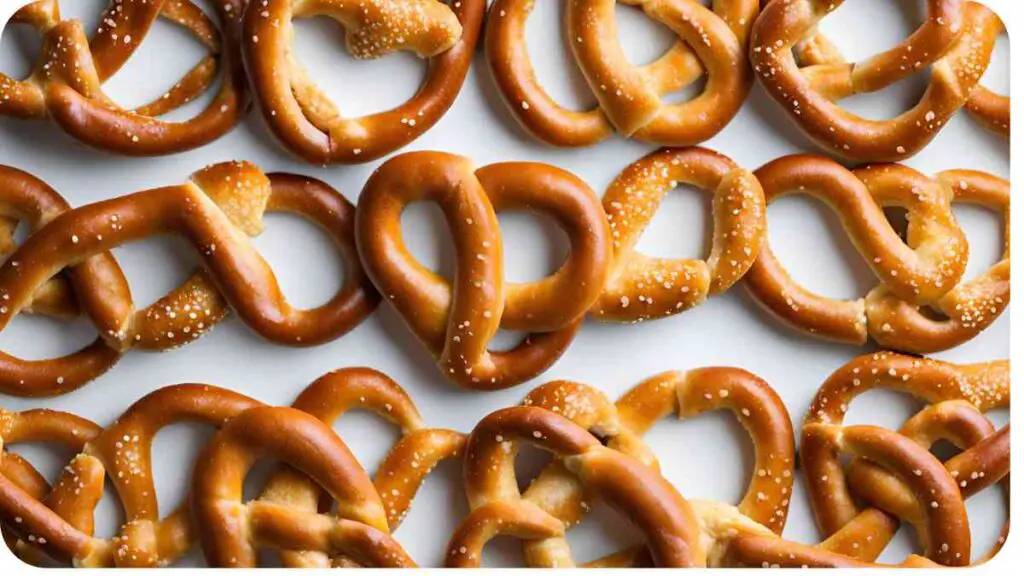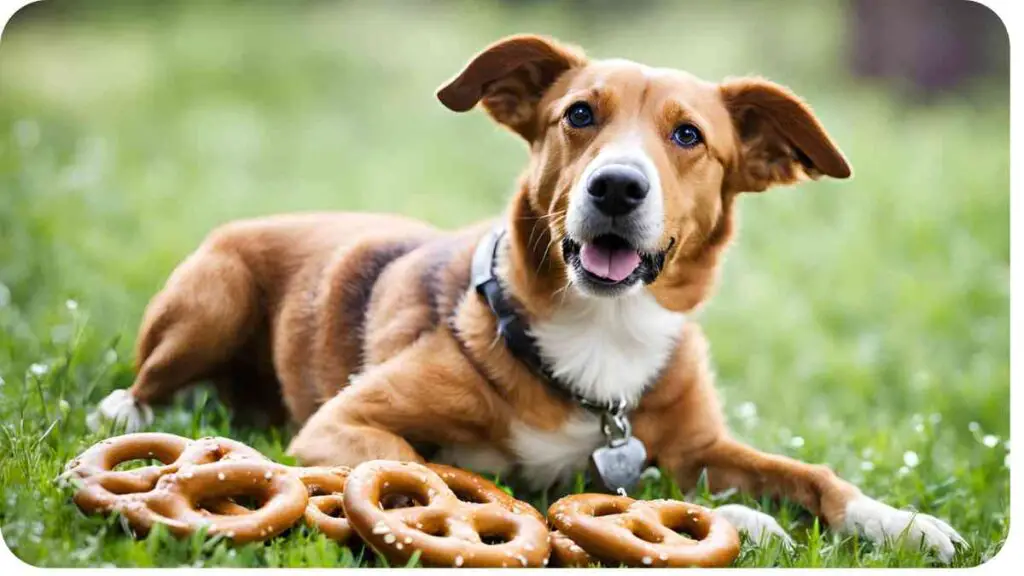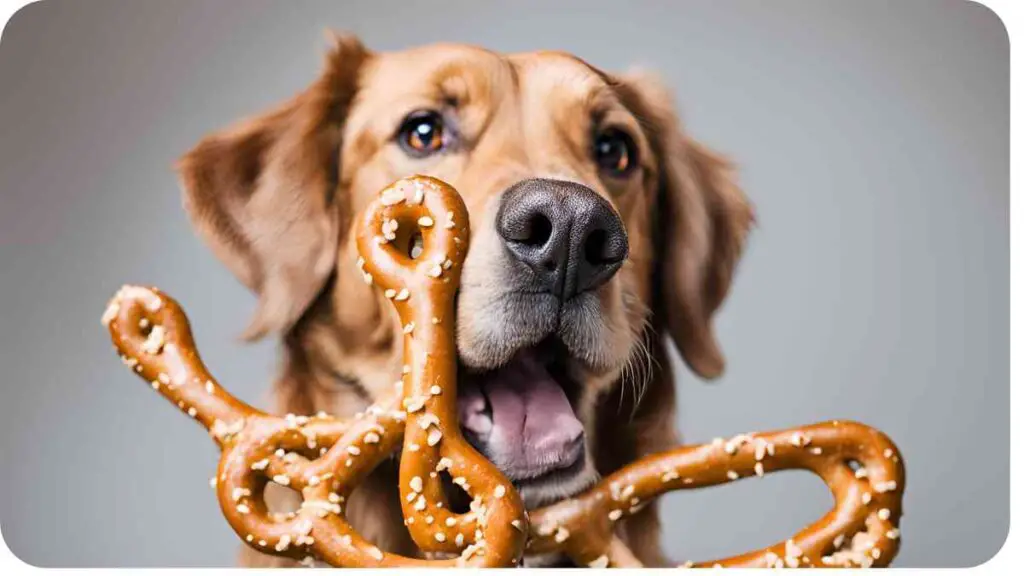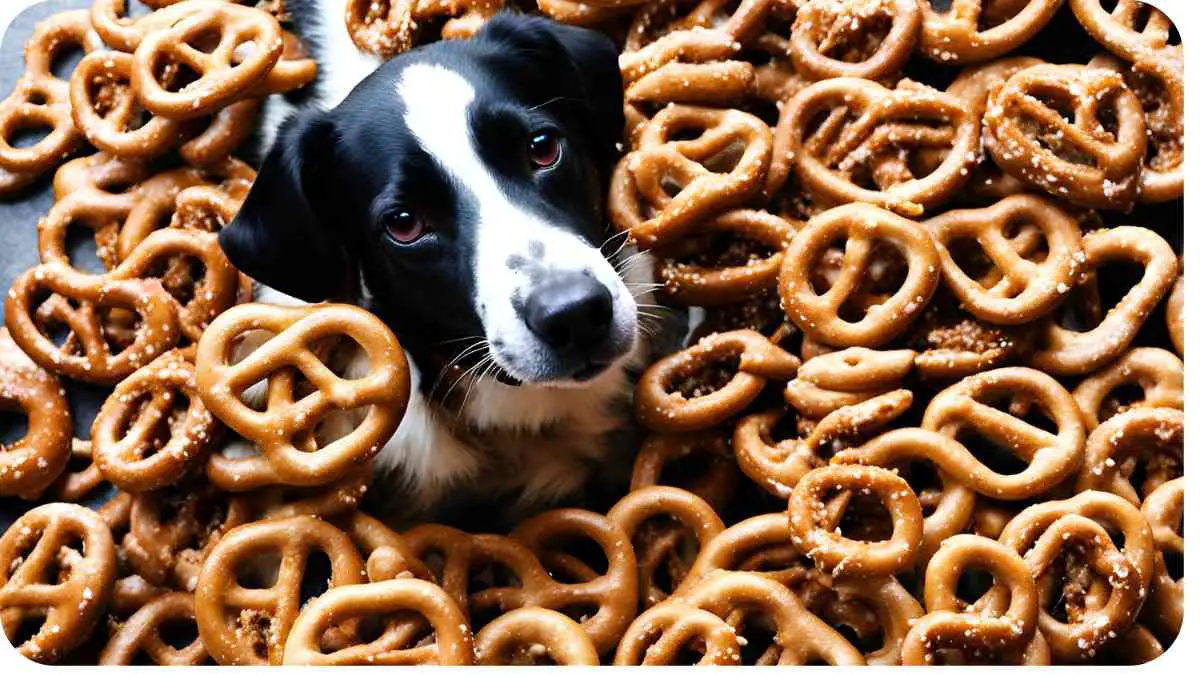Dogs are notorious for their curiosity when it comes to food. As pet owners, it’s natural to wonder about the safety of various human snacks for our furry friends. One such snack that often finds its way into our hands is the humble pretzel.
But can dogs eat pretzels safely? In this article, we’ll delve into the nutritional content of pretzels, the potential risks they pose to dogs, and safer alternatives for treating your canine companion.
| Key Takeaways |
|---|
| 1. Pretzels are not recommended for dogs due to their high sodium content and potential health risks. |
| 2. Feeding pretzels to dogs can lead to salt toxicity, digestive issues, and choking hazards. |
| 3. It’s essential to provide safe and healthy alternatives to pretzels, such as lean meats, fruits, vegetables, and commercial dog treats. |
| 4. If your dog accidentally ingests pretzels, monitor them for symptoms of distress and contact your veterinarian for guidance. |
| 5. Prevention is key – keep pretzels and other harmful foods out of your dog’s reach to avoid accidents and potential health problems. |
2. Understanding Pretzels

Pretzels are a popular snack known for their crunchy texture and salty taste. They come in various shapes and sizes, from classic twists to bite-sized nuggets. Typically made from dough that’s been twisted into a knot-like shape, pretzels are then baked to perfection. While they may be delicious for humans, the question remains: are they suitable for dogs?
While French fries are a tempting treat, it’s crucial to understand their potential harm to your furry friend’s health. Comprehensive Guide reveals the hidden dangers and offers insight into safer alternatives for your canine companion.
Nutritional Content of Pretzels
Before we can determine whether pretzels are safe for dogs, let’s take a closer look at their nutritional profile. The table below outlines the key components of a typical pretzel:
| Nutrient | Amount per Serving |
|---|---|
| Calories | 110 |
| Total Fat | 1g |
| Sodium | 300mg |
| Carbohydrates | 22g |
| Protein | 3g |
3. Can Dogs Eat Pretzels?
While pretzels may seem harmless, especially given their simple ingredients, it’s essential to consider how they might affect our canine companions.
Potential Risks for Dogs
Despite their enticing aroma and crunchiness, pretzels pose several risks to dogs:
- High Sodium Content: One of the most significant concerns with pretzels is their high sodium content. Dogs have much lower tolerances for sodium compared to humans. Excessive sodium intake can lead to dehydration, electrolyte imbalances, and even sodium ion poisoning, also known as salt toxicity.
- Digestive Issues: Pretzels are made from refined flour, which can be difficult for dogs to digest. Consumption of pretzels may lead to gastrointestinal upset, including symptoms like vomiting, diarrhea, and abdominal discomfort.
- Choking Hazard: The hard and brittle texture of pretzels can pose a choking hazard, especially for small dogs or those prone to gulping their food without chewing properly.
Given these potential risks, it’s best to avoid feeding pretzels to your dog altogether.
4. Health Effects of Pretzels on Dogs

Sodium Intake
Sodium is an essential mineral for dogs, but excessive amounts can be harmful. Pretzels contain a significant amount of sodium, which can lead to dehydration and electrolyte imbalances in dogs. Symptoms of salt toxicity include excessive thirst, vomiting, diarrhea, tremors, seizures, and even death in severe cases.
Curious about what fruits your dog can enjoy? Dive into the world of canine-friendly fruits like honeydew melon. Learn more about this sweet treat’s benefits and potential risks in Honeydew Melon
Digestive Issues
The high carbohydrate content and refined flour in pretzels can be challenging for dogs to digest. Consumption of pretzels may lead to gastrointestinal upset, including gas, bloating, diarrhea, and abdominal pain.
Choking Hazard
Pretzels have a hard and brittle texture, making them a potential choking hazard, especially for small dogs or those who tend to eat quickly without chewing their food thoroughly. Choking incidents can be life-threatening and require immediate veterinary attention.
5. Alternatives to Pretzels for Dogs
While pretzels may not be suitable for dogs, there are plenty of safe and healthy alternatives to consider when treating your furry friend.
Safe Treat Options
When it comes to rewarding your dog, opt for treats specifically designed for canine consumption. Look for treats that are low in sodium, free from artificial additives, and made from wholesome ingredients. Some safe options include:
- Lean Meat: Cooked chicken, turkey, or beef can make for a tasty and protein-rich treat for your dog.
- Fruits and Vegetables: Many fruits and vegetables are safe for dogs and provide essential nutrients. Consider offering your dog small pieces of apple, carrot, or blueberries as a snack.
- Commercial Dog Treats: Choose high-quality, reputable brands that offer treats tailored to your dog’s size, age, and dietary needs.
Homemade Dog Treat Recipes
If you prefer to make treats at home, there are numerous recipes available that cater to dogs’ nutritional requirements. Here’s a simple recipe for homemade dog treats:
Peanut Butter Banana Bites
| Ingredients | Amount |
|---|---|
| Ripe banana | 1 |
| Peanut butter | 2 tablespoons |
| Oats (rolled or quick) | 1 cup |
| Water | As needed |
- Preheat your oven to 350°F (175°C) and line a baking sheet with parchment paper.
- In a mixing bowl, mash the ripe banana until smooth.
- Add the peanut butter and oats to the mashed banana and mix until well combined. If the mixture is too dry, add a splash of water to achieve a dough-like consistency.
- Roll the dough into small bite-sized balls and place them onto the prepared baking sheet.
- Flatten each ball with a fork to create a cookie shape.
- Bake in the preheated oven for 12-15 minutes, or until the treats are golden brown and firm to the touch.
- Allow the treats to cool completely before serving to your dog.
These homemade treats are a delicious and nutritious alternative to store-bought snacks, and your dog is sure to love them!
Heartworms pose a serious threat to your dog’s health, but there’s hope. Explore the range of Effective Treatments available to combat this dangerous condition and safeguard your beloved pet’s well-being.
6. Signs of Pretzel Toxicity in Dogs
If your dog accidentally ingests pretzels or any other food that may be harmful, it’s essential to be vigilant for signs of toxicity. Common symptoms of pretzel toxicity in dogs include:
- Excessive thirst
- Vomiting
- Diarrhea
- Lethargy
- Tremors
- Seizures
If you notice any of these symptoms or suspect that your dog has ingested pretzels, contact your veterinarian immediately for guidance and treatment.
7. What to Do If Your Dog Eats Pretzels

If your dog consumes pretzels, it’s crucial to take swift action to minimize any potential harm.
- Assess the Situation: Determine how much pretzel your dog has eaten and whether they are showing any immediate signs of distress.
- Contact Your Veterinarian: If you’re unsure whether the amount ingested is safe for your dog or if they are exhibiting symptoms of toxicity, contact your veterinarian for guidance. Provide details about the type of pretzel consumed, the quantity, and your dog’s current condition.
- Monitor Your Dog: Keep a close eye on your dog for any signs of gastrointestinal upset, salt toxicity, or choking. Look out for symptoms such as vomiting, diarrhea, excessive thirst, lethargy, tremors, or difficulty breathing.
- Offer Water: Encourage your dog to drink plenty of water to help flush out any excess salt and prevent dehydration.
- Follow Your Veterinarian’s Advice: Your veterinarian may recommend specific steps to take based on your dog’s condition and the amount of pretzel ingested. Follow their instructions carefully and seek veterinary care if necessary.
Remember, prevention is always better than cure. Keep pretzels and other potentially harmful foods out of your dog’s reach to avoid accidental ingestion.
Don’t let a yeast infection dampen your dog’s spirits. Discover practical tips and effective solutions to treat and prevent paw infections in Yeast Infection, ensuring your canine companion stays happy and healthy.
8. Tips for Keeping Your Dog Safe
To ensure your dog’s safety and well-being, here are some tips to keep in mind:
Supervision
- Monitor Your Dog’s Diet: Be mindful of what your dog eats, and avoid feeding them foods that may be harmful or unhealthy.
- Supervise Treat Time: When giving your dog treats, supervise them to prevent choking or overindulgence.
Training
- Teach “Leave It” Command: Train your dog to leave items on command, which can help prevent them from eating potentially dangerous foods.
- Positive Reinforcement: Use positive reinforcement techniques to reward good behavior and discourage undesirable habits.
Healthy Treat Alternatives
- Explore Safe Options: Research safe and nutritious treats for your dog, and offer them as alternatives to potentially harmful snacks like pretzels.
- Homemade Treats: Consider making homemade treats using dog-friendly ingredients to ensure their safety and quality.
By implementing these tips and being proactive about your dog’s well-being, you can help keep them safe and healthy for years to come.
Keep your energetic pup entertained and engaged with the best ball throwers designed for active dogs. Explore innovative options and playful solutions in Ball Throwers, fostering endless fun and bonding moments with your furry friend.
Conclusion
While pretzels may be a tempting snack for humans, they are not suitable for dogs due to their high sodium content, digestive challenges, and choking hazards. Instead of risking your dog’s health, opt for safe and nutritious alternatives that are specifically designed for canine consumption.
By being mindful of what your dog eats and providing them with appropriate treats, you can ensure their safety and well-being. If your dog accidentally ingests pretzels or exhibits any signs of distress, contact your veterinarian immediately for guidance and assistance. Remember, a little precaution goes a long way in keeping your furry friend happy and healthy.
Further Reading
For more information about whether dogs can eat pretzels and tips for keeping your furry friend safe, check out these resources:
- Pretzels.com – Can Dogs Eat Pretzels?: This blog post explores the topic of dogs eating pretzels, discussing the potential risks and alternatives.
- MasterClass – Can Dogs Eat Pretzels?: MasterClass offers insights into whether pretzels are safe for dogs, providing expert advice on canine nutrition and health.
- The Dog Bakery – Can Dogs Eat Pretzels as a Treat?: Discover whether pretzels make suitable treats for dogs and learn about alternative snack options for your canine companion.
FAQs
Can dogs safely eat pretzels?
Pretzels are not recommended for dogs due to their high sodium content, which can lead to health issues like dehydration and salt toxicity.
What are the risks of feeding pretzels to dogs?
Feeding pretzels to dogs can pose risks such as sodium poisoning, digestive upset, and choking hazards due to their hard texture.
Are there any safe alternatives to pretzels for dogs?
Yes, there are plenty of safe and healthy alternatives to pretzels for dogs, including lean meats, fruits, vegetables, and commercial dog treats specifically formulated for canine consumption.
How can I tell if my dog has ingested too many pretzels?
Watch out for symptoms of salt toxicity, including excessive thirst, vomiting, diarrhea, tremors, and seizures. If you suspect your dog has ingested too many pretzels, contact your veterinarian immediately.
What should I do if my dog eats pretzels?
If your dog consumes pretzels, monitor them closely for any signs of distress and contact your veterinarian for guidance. Offer water to help flush out excess salt and follow any instructions provided by your vet.

I am Dr Hellen James a veterinarian, pet lover, and writer. I have many years of experience caring for pets, including dogs, cats, birds, and fish (and even axolotls!). I love spending time with the animals in my life, especially when they are sick or need love.

